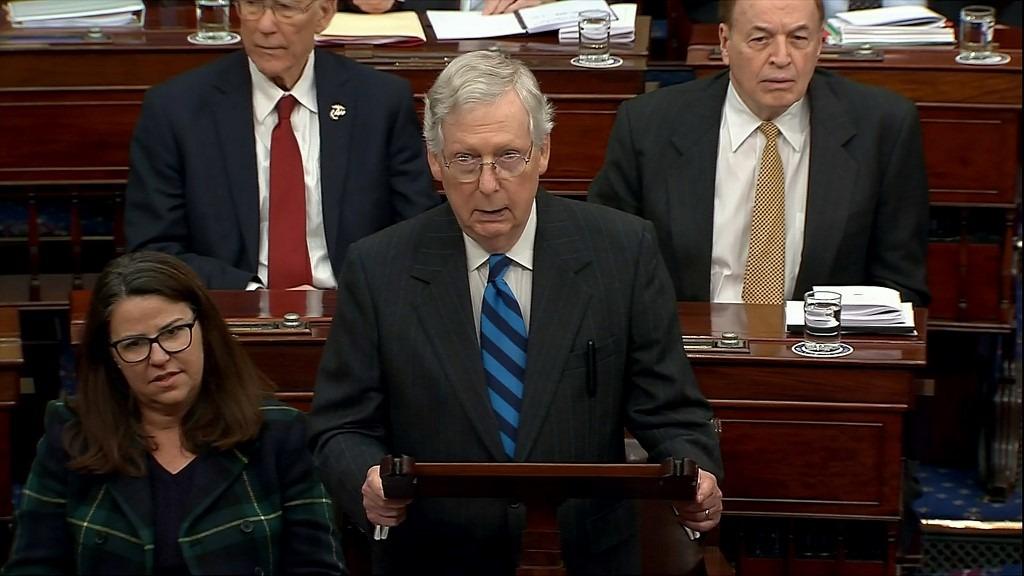 This still image taken from a US Senate webcast shows US Senator and Majority Leader Mitch McConnell (R-KY) asking questions to House Managers during the impeachment trial in the Senate Chamber at the US Capitol on Jan 30, 2020 in Washington, DC. (HO / AFP / US Senate TV)
This still image taken from a US Senate webcast shows US Senator and Majority Leader Mitch McConnell (R-KY) asking questions to House Managers during the impeachment trial in the Senate Chamber at the US Capitol on Jan 30, 2020 in Washington, DC. (HO / AFP / US Senate TV)
US Republican Senator Lamar Alexander said he will vote against calling witnesses in US President Donald Trump’s impeachment trial, all but closing off chances that Democrats can secure new evidence and making it increasingly likely the trial will wrap up as soon as Friday.
“There is no need for more evidence to prove that the president asked Ukraine to investigate Joe Biden and his son, Hunter,” Alexander, who is retiring from his Tennessee seat when his term ends next January, said in a statement.
ALSO READ: Republicans hope for fast end to Trump impeachment trial
“The question then is not whether the president did it, but whether the United States Senate or the American people should decide what to do about what he did,” he said released after the Senate concluded questioning House prosecutors and Trump’s defense team. “I believe that the Constitution provides that the people should make that decision in the presidential election that begins in Iowa on Monday.”
The decision is a victory for Trump’s legal team and Senate Majority Leader Mitch McConnell, who had been steering the trial to a quick conclusion that is all but certain to end in the president’s acquittal.
”That’s a big, big deal,” Republican Senator Ted Cruz said in an interview with Fox News. Without Alexander, Democrats are “not going to break 50.”
White House congressional liaison Eric Ueland said, “We took another big step towards the president’s acquittal in the Senate today, and look forward to completing this impeachment process as soon as possible.”
Two Votes
Only Utah’s Mitt Romney and Maine’s Susan Collins have backed hearing from witnesses, including former Trump National Security Advisor John Bolton. Collins, who faces a tough re-election battle in November, said in a statement Thursday night said that “hearing from certain witnesses would give each side the opportunity to more fully and fairly make their case, resolve any ambiguities, and provide additional clarity.”
Democrats would need four Republican votes to get a majority to call witnesses in the trial. Several Republicans who had been publicly noncommittal this week announced the opposition to witnesses. The remaining potential GOP vote for witnesses is Alaska’s Lisa Murkowski. She has previously indicated openness to calling witnesses, but since a meeting with McConnell Wednesday morning she’s repeatedly refused to discuss the issue.
“I am going to go reflect on what I have heard, re-read my notes and decide whether I need to hear more,” she said in a statement after the Senate wrapped up its work on Thursday.
Even if Murkowski votes with Democrats that would likely leave the vote at 50-50. That would leave it up to Chief Justice John Roberts to decide whether he should step in as a tie-breaker. Both McConnell and Democratic leader Chuck Schumer have expressed doubt that he would. If Roberts declines to act, the witness vote would fail.
Murkowski on Thursday night asked the president’s legal team why the Senate shouldn’t call Bolton to testify. She noted that Trump administration witnesses said Trump denied linking aid for Ukraine to investigations, while reports say Bolton wrote in his upcoming book that the president made a direct link.
Trump lawyer Patrick Philbin said that subpoenaing Bolton would set a bad precedent for future presidential impeachments by allowing the House to submit an incomplete case to the Senate.
“It will do grave damage to this body as an institution to say that the process in the House doesn’t really have to be complete,” Philbin said. “That’s not the way this chamber should allow impeachments to be presented to it.”
But she also joined with Alexander and several other Republicans in asking Trump’s defense team whether testimony from Bolton would make any difference because the allegation still wouldn’t rise to an impeachable defense.
That gave Trump’s lawyers an opening to hammer home a point they’ve been making repeatedly over the past two days. Philbin and the other Trump attorneys have argued that if the president is acting with mixed motives, for both policy and political reasons, the House does not have a case for impeachment.
Another Trump defense attorney, Harvard law professor Alan Dershowitz, went even further on Wednesday, saying a president can’t be impeached for taking actions that are motivated by a desire to help his political prospects.
Democrats on Thursday repeatedly sought to rebut that argument.
“What we have seen over the last couple of days is a descent into constitutional madness,” said Adam Schiff, the lead House impeachment manager. “The only reason you make that argument is because you know your client is guilty and dead to rights. This is an argument made of desperation.”
McConnell had been working behind the scenes to shore up support for bringing the trial to a quick conclusion.
READ MORE: NYT: Trump wanted to freeze security to Ukraine
Friday will start with two hours of closing arguments from each side. Then the Senate would vote on the question of calling witnesses. If that fails, the chamber would move toward a vote on final judgment on the two impeachment articles against Trump, one charging him with abuse of power and the other with obstructing Congress.
With a 67-vote super-majority needed to convict in the GOP-led chamber, Trump is expect to be easily acquitted.


